Oil prices spiraled downward on Monday, with the US crude futures May contract plunging more than 40 percent to its lowest level since 1986, as investors worried about lack of storage and German and Japanese data indicated a bleak global economy.
Brent, the global benchmark, was down $1.56, or 5.6 percent, to $26.52 a barrel, while the front-month May West Texas Intermediate (WTI) contract fell $8.16, or 44.7 percent, to $10.11 a barrel.
Prices have been pressured for weeks since with the coronavirus outbreak hammering demand even as Saudi Arabia-led OPEC and its allies led by Russia failed to reach an agreement to cut supply. The two sides, with US urging, agreed more than a week ago to cut supply by 9.7 million bpd, but that will not quickly reduce the global glut.
Brent oil prices have collapsed around 60 percent since the start of the year, while US crude futures have fallen more than 80 percent, to levels far, far below break-even costs necessary for many shale drillers. This has led to drilling halts and drastic spending cuts.
US crude futures hit a low of $10.01 a barrel, the lowest since 1986. Analysts said the sell-off was exaggerated by the May contract’s imminent expiry.
The spread between the front-month May contract and the second month June contract was more than $12 – the widest in history- as the June contract, which is more actively traded, fell $2.31, or 9.2 percent, to $22.72 a barrel.
Many investors appeared to have been misled by what appeared to be a very low oil price and to have failed to take into consideration the expiry of oil future contracts, which takes place each month, Commerzbank analyst Carsten Fritsch said.
When a futures contract expires, traders must decide whether to take delivery or roll positions into an upcoming contract. Usually this process is relatively uncomplicated, but the May contract’s decline reflects worries about an inordinate glut of supply.
The volume of oil held in US storage, especially at the Cushing delivery point for the WTI contract in Oklahoma, is rising as refiners throttle back activity in the face of weak demand.
Crude stockpiles at Cushing rose 9 percent in the week to April 17, totaling around 61 million barrels, market analysts said, citing a Monday report from Genscape.
Oil in floating tanker storage is also estimated at a record 160 million barrels.
More data sparks global economic concerns
Weak global economic data also put pressure on prices. The German economy is in severe recession and recovery is unlikely to be quick as coronavirus-related restrictions could stay in place for an extended period, the Bundesbank said on Monday.
Meanwhile, Japanese exports declined the most in nearly four years in March as US-bound shipments, including cars, fell at their fastest rate since 2011.
Halliburton Co, which generates most of its oil business in North America, joined its larger rival Schlumberger in taking impairment hits in the first quarter and issued a bleak outlook for North America.
Canada, the world’s fourth-largest oil producer, has begun to rein in production, but analysts say the biggest cuts lie ahead.
The Russian energy ministry has told domestic oil producers to reduce oil output by around 20 percent from their average February levels, two industry sources told Reuters news agency, which would bring Moscow in line with its commitment under a global deal.
SOURCE: REUTERS NEWS AGENCY




















































